Social media is integral to our daily lives.
With 4.8 billion social media users worldwide – accounting for 59.9% of the global population – social platforms have become necessary hubs for gathering information, connecting with our friends and loved ones, and growing our businesses.
And social media users have grown to trust and rely on their preferred social networks for everything from real-time news and updates to lifestyle hacks, product research, and more.
For marketers, the world of social media represents an expansive area of opportunity – and every user is a potential customer.
With the right tools, resources, and a strong social media strategy, marketers can leverage social media platforms to boost awareness for their business, engage their target audience, and even nurture a loyal community.
But with so many different social media platforms existing today, it’s nearly impossible to be present on every single one – let alone excel in every space.
Success in social media marketing starts with choosing the right platforms for your brand. You need to identify where your target audience is spending the most time and where it makes sense for your brands to interact with them.
In this article, we’ll look at the leading social media platforms, giving a quick overview of what they are before exploring what types of businesses might find them most useful.
Top 10 Social Media Platforms Compared
| MAU* | Revenue | Launched | Headquarters | ||
| 1 | 3 billion | Not specified | 2004 | Menlo Park, CA | |
| 2 | YouTube | 2.5 billion | $29.24 billion | 2005 | San Bruno, California |
| 3 | 2 billion | Not specified | 2010 | Menlo Park, CA | |
| 4 | TikTok | 1.2 billion | Unknown | 2016 | Culver City, CA |
| 5 | Snapchat | 750 million | $4.6 billion | 2011 | Los Angeles, CA |
| 6 | X (Twitter) | 541 million | $4.4 billion | 2003 | Mountain View, CA |
| 7 | 465 million | $2.8 billion | 2005 | San Francisco, CA | |
| 8 | 430 million | $400 million | 2010 | San Francisco, CA | |
| 9 | <350 million | $12. 4 billion | 2006 | San Francisco, CA | |
| 10 | Threads | 100 million | Unknown | 2023 | Menlo Park, CA |
*Number of monthly active users worldwide, updated October 2023.
The Top 10 Social Media Apps By Monthly Active Users
| Social media platform | MAU* | |
| 1 | 3 billion | |
| 2 | YouTube | 2.5 billion |
| 3 | 2 billion | |
| 4 | TikTok | 1.2 billion |
| 5 | Snapchat | 750 million |
| 6 | X (Twitter) | 541 million |
| 7 | 465 million | |
| 8 | 430 million | |
| 9 | <350 million | |
| 10 | Threads | 100 million |
*Number of monthly active users worldwide updated October 2023.
The Top 10 Social Media Sites And Platforms
1. Facebook
 Screenshot by author, November 2023
Screenshot by author, November 2023- Headquarters: Menlo Park, CA.
- Launched: 2004.
- Monthly Active Users: 3 billion.
- Founders: Mark Zuckerberg, Eduardo Saverin, Andrew McCollum, Dustin Moskovitz, Chris Hughes.
- Revenue: Facebook-specific revenue not known.
While Facebook might not be the exciting new platform it once was – and might have fallen out of favor with younger users – make no mistake: it’s still around, and more popular than ever.
Today, Facebook operates under the umbrella of Meta, Inc., which also owns platforms like Instagram, WhatsApp, and Threads. Per Meta’s full-year earnings report, its “Family of Apps” – which includes Facebook, Instagram, Messenger, WhatsApp, and other apps – generated a total of $114.45 billion in revenue in 2022.
In recent years, Facebook has undergone a demographic shift – yet its influence in the social media sphere remains unparalleled.
Industries such as financial services, ecommerce, retail, media, telecom, technology, and consumer goods continue to harness Facebook’s expansive reach to connect with consumers and grow their brand awareness – with newer sectors like gaming, entertainment, and automotive businesses also finding their footing on the platform.
If you’re looking to drive conversions, your best bet is to invest in Facebook ads – especially given the News Feed is increasingly suppressing business posts.
That said, there are still plenty of ways to generate organic engagement without investing in ads.
Consider joining (or building) niche communities with Facebook Groups, leveraging Messenger chatbots for personalized communication, or using live video to encourage real-time audience interaction.
2. YouTube
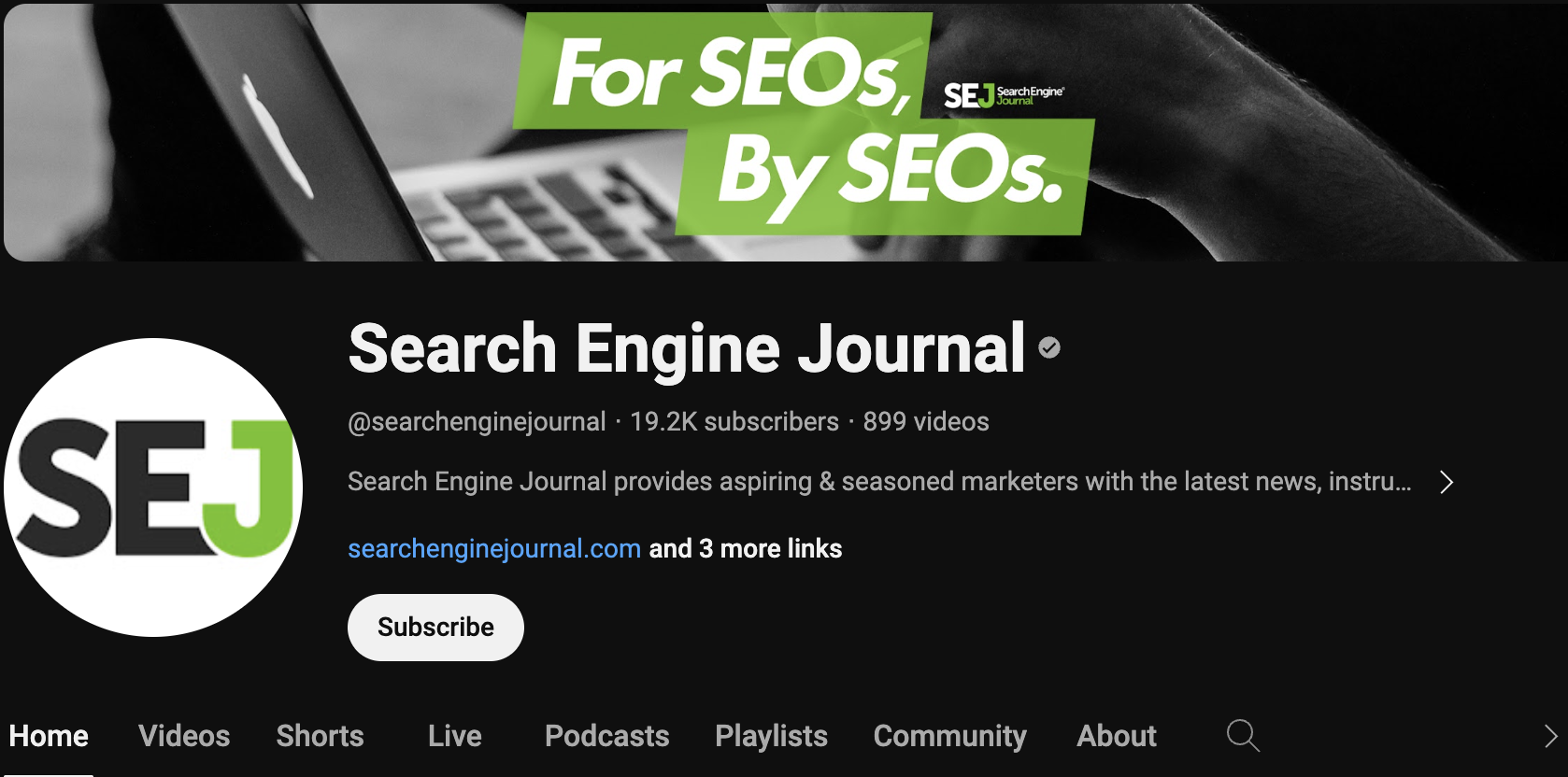 Screenshot by author, November 2023
Screenshot by author, November 2023- Launched: 2005.
- Headquarters: San Bruno, California.
- Monthly Active Users: 2.5 billion.
- Revenue: $29.24 billion (2022).
- Founders: Jawed Karim, Steve Chen, Chad Hurley.
YouTube continues to hold the crown as the dominant original video social media platform. It is currently the second most used platform, with 2.5 billion monthly active users.
According to Alphabet’s Q4 2022 earnings, YouTube ads generated $29.24 billion in revenue in 2022. It’s worth noting that that number does not include revenue from non-advertising sources, which includes subscription revenues from services like YouTube TV and YouTube Premium.
The potential for reach on YouTube is unrivaled, with 81% of U.S. adults using the platform. Such engagement metrics are hard for marketers and brands to ignore.
From longform video storytelling to the recent introduction of YouTube Shorts, the platform’s TikTok rival, YouTube provides plenty of opportunities for brands to engage in visual storytelling and reach new audiences.
And according to the company, it’s a very powerful marketing tool. YouTube viewers say they’re 2X more likely to buy something they saw on YouTube, and 4X more likely to use the platform to find information about a brand, product, or service versus other social networks.
Whether you’re into beauty tutorials, gaming streams, education content, or DIY hacks, YouTube has it all. And for brands aiming to pivot into video-centric content marketing, YouTube is the platform to prioritize.
3. Instagram
 Screenshot by author, November 2023
Screenshot by author, November 2023- Headquarters: Menlo Park, CA.
- Launched: 2010.
- Monthly Active Users: 2 billion.
- Founders: Kevin Systrom, Mike Krieger.
- Revenue: Instagram-specific revenue not known.
Instagram is a social network where product-based businesses, influencers, and coaches can thrive.
Launched in 2010, Instagram quickly became the leading image-based, visually-rich social platform. Since then, it has only grown in popularity and reach, becoming a place for users to conduct and research every aspect of their lives.
The platform has also introduced new features that marketers can leverage to grow awareness, including ephemeral Stories, vertical-video Reels, and more.
Since introducing shoppable posts in 2018, the potential ROI for product-based businesses has been higher than ever.
Not only can B2B businesses connect with a massive audience, they can seamlessly transition followers from product research to purchase by linking product information and making sales – all within the Instagram interface.
And if your target demographic is under 35, Instagram is a gold mine: over 68% of Instagram users are under 35.
4. TikTok
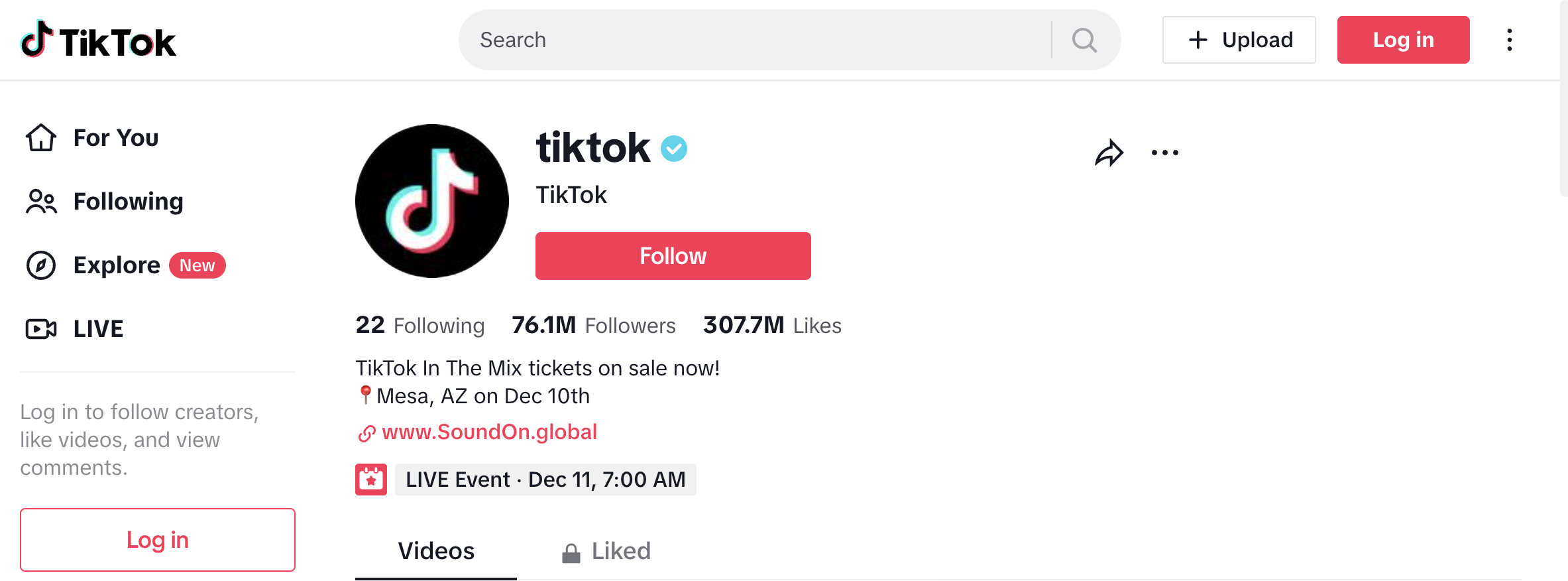 Screenshot by author, November 2023
Screenshot by author, November 2023- Launched: 2016.
- Headquarters: Culver City, California.
- Monthly Active Users: 1.2 billion.
- Founders: ByteDance Ltd, Zhang Yiming, Toutiao.
- Revenue: Unknown.
TikTok bills itself as “the leading destination for short-form mobile video” with a company mission to inspire creativity and bring joy. And evidently, it’s succeeding.
As a privately held company, ByteDance is not required to disclose financial information, so we cannot be certain of TikTok’s annual revenue. However, a report from Bloomberg suggests the parent company generated somewhere in the ballpark of $80 billion in 2022 – and the social app accounts for a percentage of that.
TikTok’s meteoric rise over the past few years has been unprecedented. In 2017, after only one year, the app became the fastest-growing app worldwide.
Its focus on short-form videos driven by audio and visual trends has taken the world by storm, with other platforms rushing to emulate it.
Despite attempts to ban TikTok in the U.S. and being banned in India, as of 2021, the app had been downloaded more than 3.5 billion times globally.
And while TikTok reaches users of all demographics, if your brand wants to connect with Generation Z, it should be your first priority.
In the U.S., it’s particularly popular among the 12 to 17 age bracket, who constitute about 17.7% of the user base.
Those users are highly engaged, too, with the average user spending nearly 54 minutes on the app every day – the longest amount of time of any app, ahead of YouTube at 48.7 minutes.
5. Snapchat
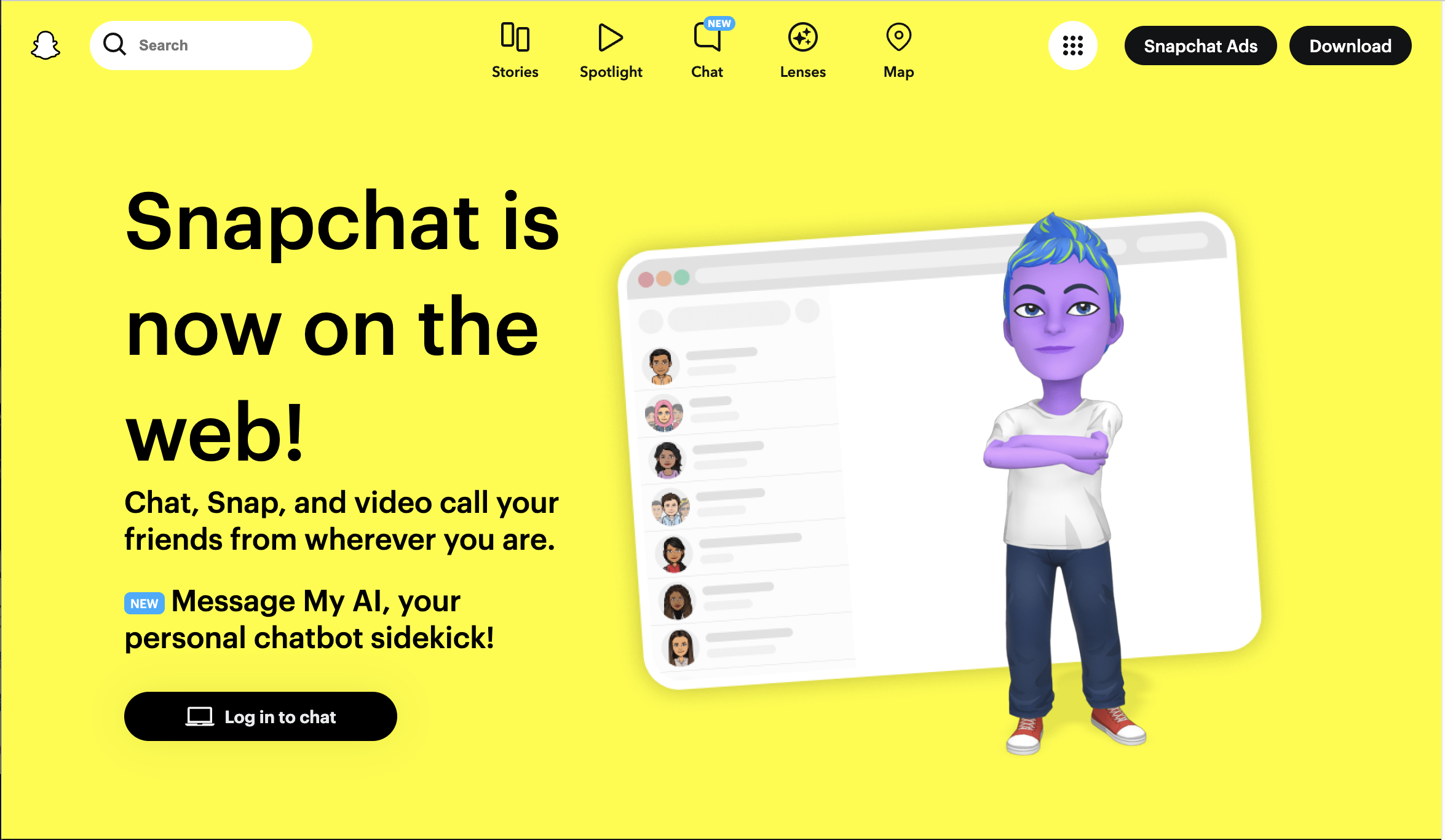 Screenshot by author, November 2023
Screenshot by author, November 2023- Headquarters: Los Angeles, CA.
- Launched: 2011.
- Monthly Active Users: 750 million.
- Founders: Evan Spiegel, Bobby Murphy, Daniel Smith, David Kravitz, Leo Noah Katz.
- Revenue: $4.6 billion (2022).
If a younger audience is your target, Snapchat might be a platform worth considering. This social platform is a great place for connecting with millennials and Gen Z users.
Snapchat now reaches 70% of 13 to 24-year-olds, showcasing its immense appeal to the younger generation.
The average Snapchat user spends 19 minutes per day on the app – not enough time to rival that of TikTok and YouTube, but still an opportunity window for brands to reach and connect with them.
Snapchat has a uniquely organic feel, with content that offers an unfiltered glimpse into everyday moments – so the platform is a haven for user-generated content, behind-the-scenes videos, exclusive offers, and influencer takeovers.
The platform has always maintained its commitment to real-time, ephemeral content, and it offers a sense of privacy to users that many other social platforms do not. For this reason, it’s a worthwhile tool for brands that want to authentically speak to a younger demographic who might be less interested in the broader approaches of other social networks.
And while it may not get as much attention as the likes of Instagram and TikTok, Snapchat is quietly humming along. Since launching its premium subscription service Snapchat+, the brand announced it has generated 5 million paying subscribers who are willing to dish out money for access to exclusive features.
6. X/Twitter
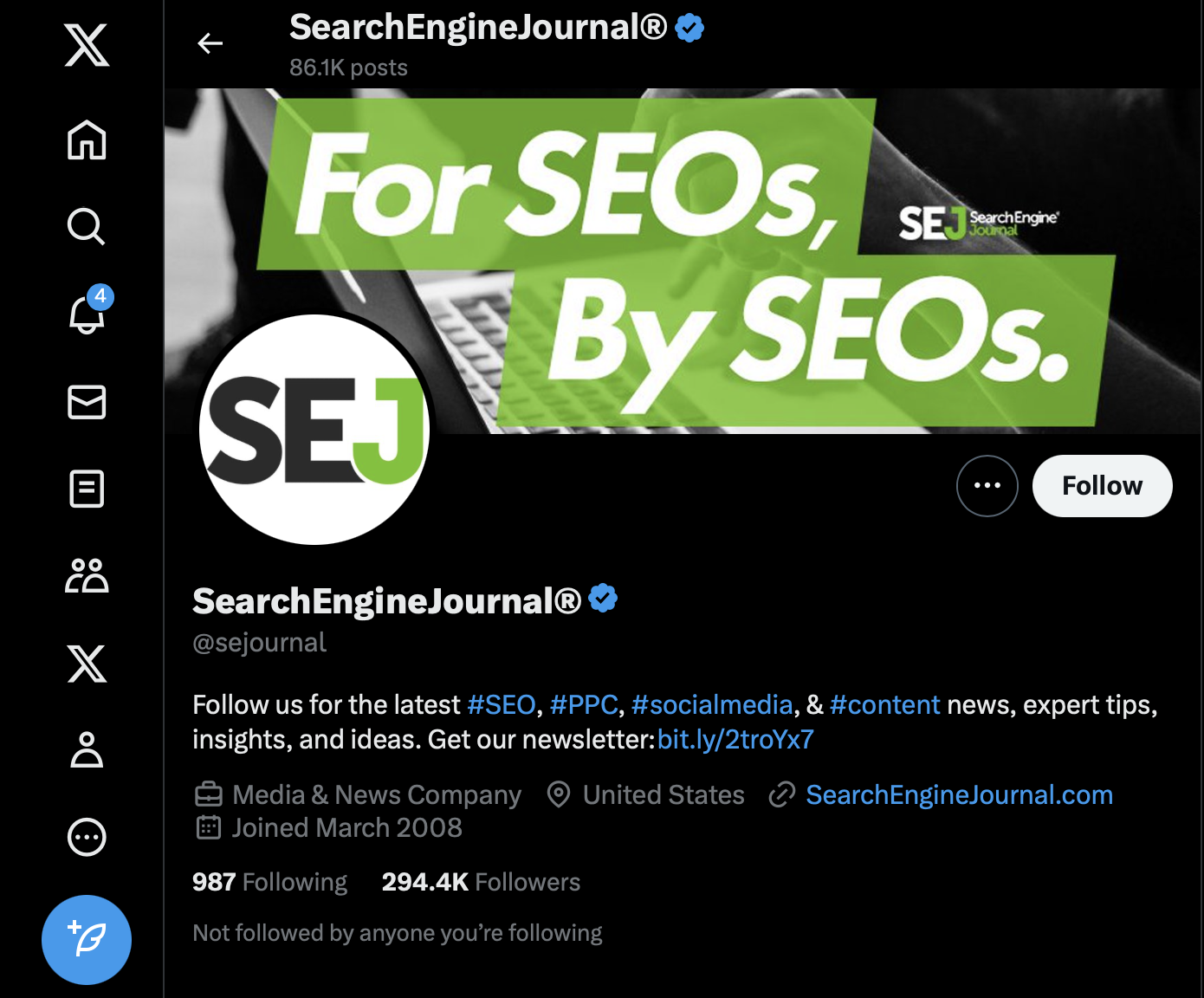 Screenshot by author, November 2023
Screenshot by author, November 2023- Headquarters: San Francisco, CA.
- Launched: 2006.
- Monthly Active Users: 541 million (July 2023).
- Founders: Jack Dorsey, Evan Williams, Biz Stone, Noah Glass.
- Revenue: $3 billion (2023) estimated.
Since being purchased by Tesla CEO Elon Musk in October 2022 for $44 billion, Twitter has undergone some major changes – including its rebranding as “X.”
Other changes Musk has made during his time as CEO include introducing Twitter Blue (now X Premium), a paid monthly subscription service that attached a price tag to verification, shutting down a number of bot accounts, and launching a service where creators can get paid a percentage of revenue generated by their subscribers.
This could explain the fluctuation in the data and numbers around X’s traffic and users. While some sources show X’s traffic as being down YoY, a July tweet from Musk revealed that monthly users reached an all-time high in 2023.
One thing is certain: X (formerly Twitter) remains a space to watch. Despite some turmoil over the past year, it’s clear that there are big plans for the platform, and it remains a forerunner among social media platforms.
If your business is related to entertainment, sports, politics, tech, or marketing, there are still opportunities to drive great engagement on this app – if you can find your audience there.
On X, brands have an opportunity to craft and hone their voice. There’s room to be clever and personable while still being informative and helpful.
Jump into conversations, provide value, share your own content as well as others, and join the conversation. Just be sure to monitor the app and your audience to make sure your investment is paying off.
7. Pinterest
 Screenshot by author, November 2023
Screenshot by author, November 2023- Launched: 2010.
- Headquarters: San Francisco, CA.
- Monthly Active Users: 465 million.
- Founders: Ben Silbermann, Paul Sciarra, Evan Sharp.
- Revenue: $2.8 billion (2022).
Like Instagram, Pinterest is a social media platform that’s focused on rich visuals. From delicious recipes to home decor inspiration, wedding ideas, workout moves, and DIY-related content, Pinterest is where visual dreams come to life.
If your brand has an interest in visual storytelling, Pinterest is the platform for you.
Notably, 60% of Pinterest users are women. If your audience is predominantly women, that’s a compelling reason to invest time in social media marketing on Pinterest.
That’s not to say that men aren’t on Pinterest – male Pinners are up 40% year-over-year (as are Gen Z Pinners!).
What’s more, Pinterest has proven itself to be a powerful marketing tool. 89% of weekly Pinners use the platform for inspiration on their path to purchase, while 80% have discovered a new brand or product on Pinterest.
8. Reddit
 Screenshot by author, November 2023
Screenshot by author, November 2023- Launched: 2005.
- Headquarters: San Francisco, CA.
- Monthly Active Users: 430 million.
- Founders: Steve Huffman, Alexis Ohanian, Aaron Swartz.
- Revenue: $400 million (estimated).
Reddit heralds itself as “the front page of the internet,” and according to Alexa rankings, Reddit is one of the top 20 most-visited sites.
Since it’s not a public company, Reddit does not have to disclose its financials, so we don’t have an exact picture of its annual revenue. However, in mid-2021, the company referred to having hit $100 million in quarterly ad revenue – so, based on this, we can reasonably assume it’s in the ballpark of $400 million.
It has become known as the dominant digital watercooler, and replaced forums and chatrooms of yore to be the go-to place for connecting with likeminded communities and getting your questions answered.
Reddit has a unique blend of content and community, with more than 2.8 million communities, or subreddits, dedicated to every topic imaginable. Whether you’re in tech, fashion, gaming, or health, there’s at least one subreddit actively discussing your industry.
With so many niches, there’s a place for every brand and business to engage their audience – it’s a matter of finding the niches where your potential customers are active and diving in.
However, be warned: Reddit thrives on authenticity and genuine interaction. Users don’t typically respond well to blatant self-promotion, and marketing gimmicks will be met with sharp skepticism.
Brands should beware before wandering into any subreddit and trying to tout their products to community members.
It’s crucial to get the tone right from the beginning, as commentators won’t hesitate to call out and critique what they perceive as inauthentic.
Engage thoughtfully, contribute genuinely, and Reddit could be an incredible marketing tool for your brand.
9. LinkedIn
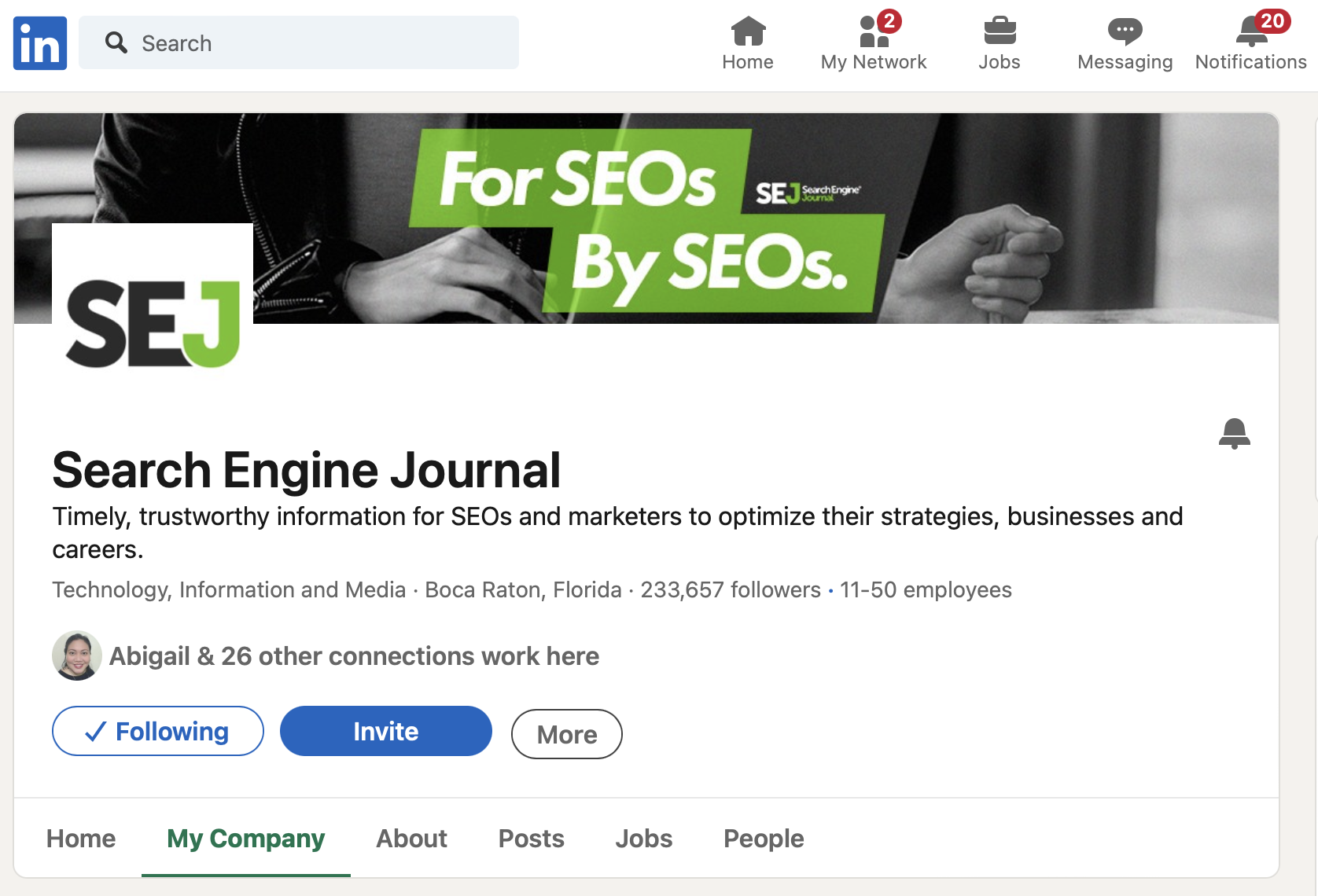 Screenshot from author, November 2023
Screenshot from author, November 2023- Headquarters: Sunnyvale, CA.
- Launched: 2003.
- Monthly Active Users: <350 million (2023) estimated.
- Founders: Reid Hoffman, Konstantin Guericke, Allen Blue, Jean-Luc Vaillant, Eric Ly.
- Revenue: $15 billion+ (2023).
LinkedIn has been somewhat of a dark horse among social media platforms. While many may not initially have expected a career-focused social platform to take off, it has become one of the more popular and engaging platforms, with a vast and influential community of professionals.
Unlike other social media platforms, LinkedIn does not publicly share its number of monthly active users. However, as part of the EU’s new DSA, the company did release MAU counts for its EU users – and by taking the percentage of active users in the EU and applying the same trends to global user counts (and accounting for variations in usage), the team at Social Media Today was able to come up with “less than 350 million” as a reasonable estimate.”
The platform boasts over 180 million users holding senior roles, 63 million decision-makers, and 10 million C-level executives – making it a hotspot for those aiming to connect with folks who have the power to hire your company, stock your product, or partner with your brand.
And the platform isn’t just for networking – it’s an aspirational hub. Every week, 61 million people use LinkedIn to search for job opportunities – so it’s a smart place to market your brand.
LinkedIn is a very focused social media platform. Because of that, it has unlimited potential for connecting with an elite group of professionals who can make a difference for your business.
10. Threads
 Screenshot from author, November 2023
Screenshot from author, November 2023- Headquarters: Menlo Park, CA.
- Launched: 2023.
- Monthly Active Users: 100 million (2023).
- Founders: Mark Zuckerberg.
- Revenue: Unknown.
The newcomer to the block, Threads was created by the team behind Instagram and launched in July 2023. The text-based app was designed as a competitor to X (formerly Twitter).
It looks and functions quite similarly to X (formerly Twitter), though Threads requires you to have an Instagram account in order to sign up.
Threads initially made a splash in the social media space by quickly surpassing 150 million downloads and becoming the most successful social media platform launch in history.
Since then, it has struggled to retain users – but there is still plenty of promise for the future of the platform.
So, who should be advertising on Threads? It’s still early days, so the answer isn’t totally clear yet.
The good news is that Threads appears to be engaging users by leaning into its strategy to create a positive community space, and veering away from the highly politicized landscape that you might find on X.
If your brand is looking for an alternative to X (formerly Twitter) or is keen to try your hand at a new platform, Threads is certainly worth testing.
Its integration with Instagram means that you have the potential to build a following quite rapidly if you have a strong and engaged Instagram community.
Which Platform(s) Should You Use?
The ubiquity of social media is undeniable.
From your teenage neighbor who wants to go viral on TikTok to your 86-year-old grandmother who’s using Facebook to track down long-lost friends, everybody has a use for social media.
Yet, when it comes to business, a one-size-fits-all approach to social media won’t work.
So, if you were hoping you’d reach the end of this piece, and find a simple, definitive answer on the perfect platform for your brand, you’re out of luck.
Every social media mix will be unique.
Each platform offers distinct features and functionalities, some which align more naturally with specific industries or marketing objectives.
Whether you’re looking to boost customer engagement, increase reach, or create unforgettable brand experiences, it all starts with getting clear on your goals.
Start by understanding your objectives, figuring out where your audience is most active, and then tailoring your strategy to resonate on those channels.
It’s all about making the right choices and finding authentic alignment in order to make use of this powerful marketing opportunity.
Updated with data from DataReportal’s Digital 2023 October Global Statshot Report.
More resources:
Featured Image: Viktollio/Search Engine Journal
FAQ
How do marketers choose the right social media platforms for their brands?
To select the most suitable social media platforms, marketers assess the brand’s objectives, target audience, and the specific characteristics of each platform. They seek platforms where their intended audience is most active and engaged and where the nature of the content aligns with the brand’s marketing strategies. Analyzing metrics like monthly active users (MAUs) and demographic data, they aim to join platforms that facilitate the reach and engagement relevant to their brand’s goals, whether it is increasing brand awareness, driving sales, or building community.
What are the benefits of social media marketing for businesses?
Social media marketing offers a variety of benefits for businesses. It allows brands to connect with a vast audience, engage with customers in real time, and gather insights from direct feedback and social listening. Marketing on social platforms can increase brand visibility and recognition, drive targeted traffic to websites, and enhance customer loyalty through regular interaction. Moreover, social media provides data analytics that can drive informed marketing decisions and strategies, ensuring businesses can measure the effectiveness of their campaigns.
What are the factors to consider when choosing which social media platforms to focus on for marketing?
Selecting the right social media platforms for marketing depends on a variety of considerations. Here are a few key points to take into account:
- Target Audience: Knowing the demographics and behavior of your target audience is crucial. Different age groups and interests tend to gravitate towards specific platforms.
- Content Type: The type of content you create should align with the platform’s strengths—for example, visual content for Instagram or professional content for LinkedIn.
- Advertising Options: Assess the advertising tools each platform offers, such as targeting options, analytics, and ad formats that suit your marketing strategy.
- Engagement Opportunities: Some platforms may offer greater engagement through features like stories, live videos, or community groups.
- Industry Relevance: Certain industries find more success on specific platforms. For instance, B2C may excel on Instagram and Pinterest, while B2B might leverage LinkedIn more effectively.
- Brand Voice and Goals: Make sure the platform supports and amplifies your brand’s voice and helps you achieve your broader marketing objectives.
- Resource Allocation: Consider the resources you have available—including time, budget, and personnel—to manage and maintain a consistent presence on chosen platforms.
How can marketers leverage social media statistics to improve their strategies?
Marketers can use social media statistics to refine their strategies in various ways, including:
- Identifying Trending Platforms: By understanding platform growth trends, such as user base increases, marketers can determine where to focus their efforts.
- Understanding User Behavior: Statistics on how users interact with platforms, like average time spent or content engagement rates, help tailor content for maximum impact.
- Benchmarking and Measurement: Data regarding average engagement rates and other KPIs enable marketers to gauge their performance against industry standards.
- Content Optimization: Insights into popular content types and posting times help marketers optimize their content strategy for better engagement.
- Ad Targeting: Demographic data ensures ads are targeted to the right audiences, leading to higher conversion rates and ROI.
- Competitive Analysis: Comparing statistics across platforms can highlight opportunities for differentiation and competitive advantages.
